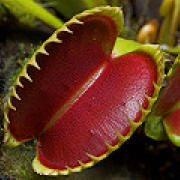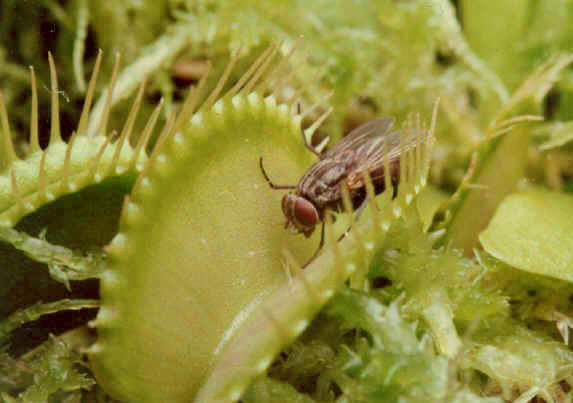| Fun Facts |
|---|
| If you're ever on a
botanical themed Jeopardy, here's all the facts you'll need to know
about Dionaea muscipula.
The Venus Fly Trap was the first plant that was thought to be carnivorous. In fact, many botanists rejected this idea, including Carl Linnaeus, the father of taxonomy. (Want to know more about history? Look here! In the Beginning ). The species, Dionaea muscipula is becoming extinct. Their specific habitat of bogs are now the sites for dumping trash, which results in the killing of many plants. In addition, many people illegally uproot these plants to grow in their own homes. (For more information about habitat, check out the Neighborhood page). During the open phase, the trap angle is between 40 - 50 degrees. (For more information click on the Adapt to Trap page).
The bugs can bite back! In the springtime, the Venus Fly Trap can be killed by the very insects it eats. Aphids can infect the plant and slowly kill it. Also, grasshoppers and caterpillars can eat parts of the plant, but this is uncommon. If one of these insects is bigger than a third of the size of the trap, it can cause severe leaf burn, stressing and killing it while the plant tries to devour it. Venus Fly Traps are health nuts. If you feed it a hamburger, the protein and fat-based meat will rot the plant, eventually killing it. Venus Fly Traps can go without eating for 1-2 months! So, if you are growing your own, never feed it more than once a week. In fact, the optimal period for feeding is every ten days. Scientists Stuhlman and Daren studied that when a Venus Fly Trap is stimulated, an electrical voltage is produced. "The action potential (voltage) runs a course characteristic of mammalian nerves in normal physiological function."
After each capture, the trap remains closed for a period of 1-2 weeks. In addition, each trap has a limit of 3-4 closures. At this point in the plant's life, they can no longer utilize the trapping feature. (For details about the trapping mechanism, take a look at the Adapt to Trap page). |

